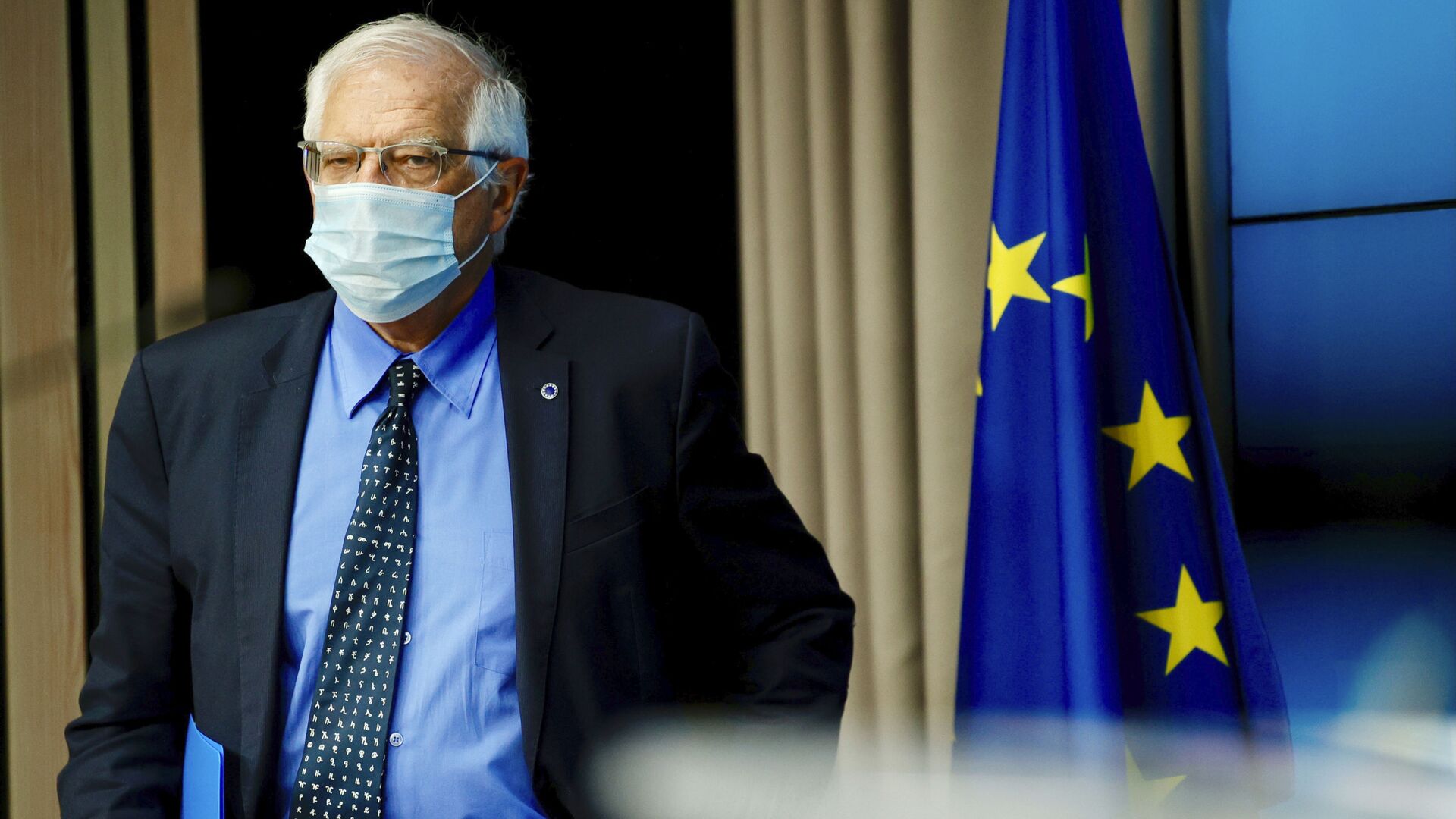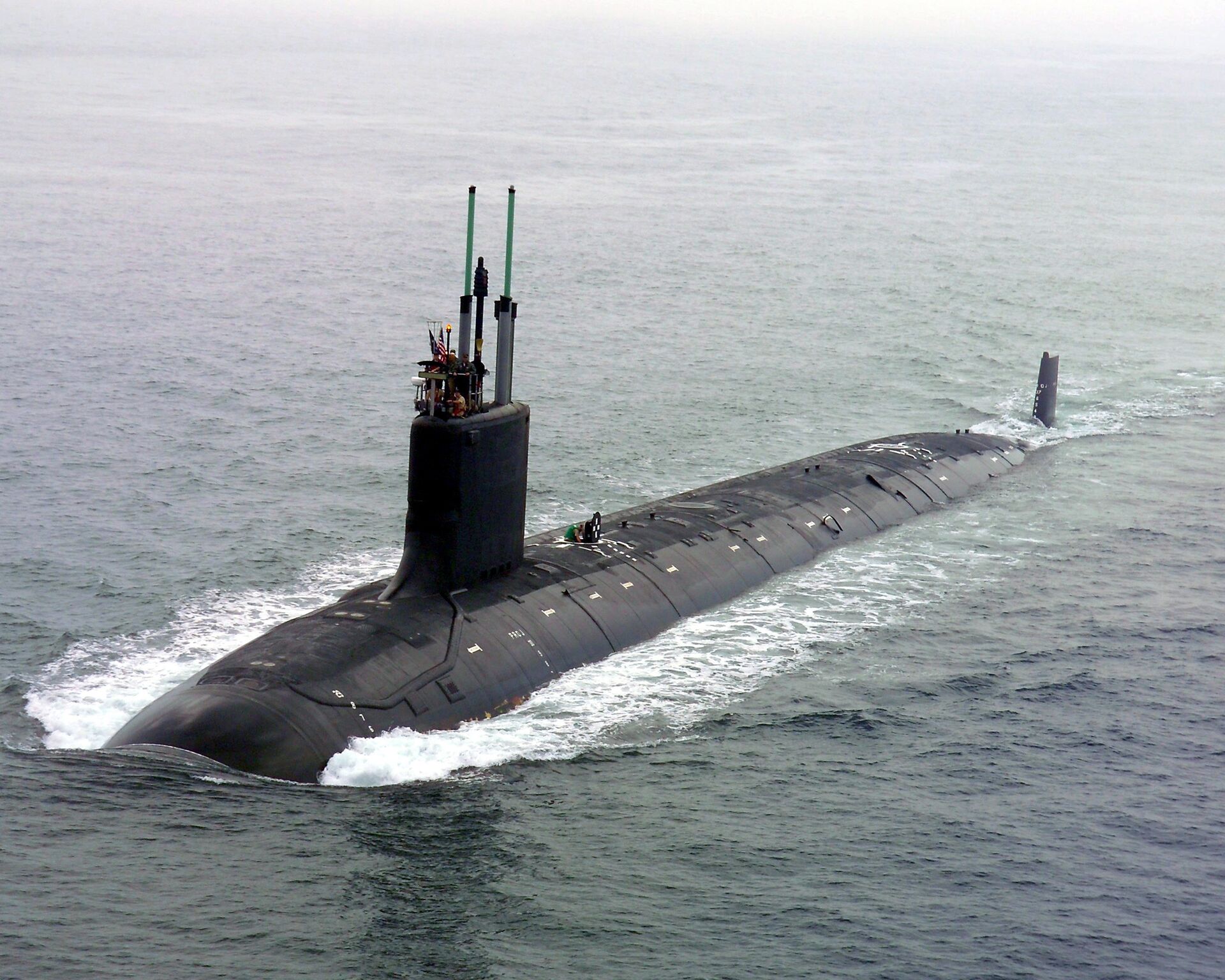https://sputnikglobe.com/20211008/eus-josep-borrell-says-australia-sought-best-protection-in-aukus-move-to-ditch-french-sub-deal-1089763726.html
EU's Josep Borrell Says Australia Sought 'Best Protection' in AUKUS Move to Ditch French Sub Deal
EU's Josep Borrell Says Australia Sought 'Best Protection' in AUKUS Move to Ditch French Sub Deal
Sputnik International
After the AUKUS agreement promised Australia’s Navy US and UK assistance with technology for nuclear submarines, the contract for their construction replaced... 08.10.2021, Sputnik International
2021-10-08T10:47+0000
2021-10-08T10:47+0000
2023-05-28T15:16+0000
aukus
jean-yves le drian
australia
josep borrell
france
scott morrison
united kingdom (uk)
https://cdn1.img.sputnikglobe.com/img/07e5/05/0f/1082904354_0:0:3011:1694_1920x0_80_0_0_6aedf831d5fe2ef6d72b4a384f3cf599.jpg
European Union foreign policy chief Josep Borrell has acknowledged that Australia's decision to abandon an earlier diesel-electric submarine procurement contract with France as part of its new AUKUS security alliance with the US and UK was "rational".The statement appears to show the EU official adopting a more conciliatory stance on the issue. Earlier in September, Australia’s security pact with the US and Britain was described by the EU's top diplomat as showing that the European Union must develop its own defence and security strategies, particularly in the Indo-Pacific.Speaking on 16 September to outline the EU’s new strategy for the Indo-Pacific region, Borrell had deplored the fact that he was not consulted on the agreement for Washington to help Canberra build a fleet of nuclear-powered submarines.The EU's chairman, Charles Michel, responded to the US accord with Australia and Britain as further demonstrating “the need for a common EU approach in a region of strategic interest." AUKUS Row Last month a transatlantic row was triggered after the security pact between Australia, the US and UK – AUKUS – was announced on 15 September. While allowing for greater sharing of intelligence, the trilateral deal offers Australia American and British technology to build nuclear-powered submarines, albeit not equipped with nuclear weapons. AUKUS, widely interpreted as targeted to offset China’s growing assertiveness in the contested South China Sea, angered France as it prompted Australia to cancel a multi-billion deal struck in 2016 for France to build 12 conventional submarines. Paris, which discovered about the new pact only hours ahead of the public announcement, felt jilted and deplored the move as a “stab in the back”. French Foreign Minister Jean-Yves Le Drian told lawmakers that "someone lied" regarding Australia's intention to ditch the sub contract immediately after joining the pact while continuing to assure Paris to the last moment that the agreement was still in place. "Something doesn't add up and we don't know what," he said.The head of the French defence contractor Naval Group, Pierre Eric Pommellet, also reiterated the company’s “astonishment and stupefaction” at being told the submarine contract with Australia was being torn up. In the wake of the announcement, France recalled its ambassadors from both Canberra and Washington. After it was first announced that the envoy to Washington would return to his post two seeks ago, Australia ambassador Jean-Pierre Thebault is also now returning to Canberra to “help redefine the terms of our relationship with Australia”, stated Le Drian in front of a parliamentary hearing on Wednesday. ‘Clear Solidarity with France’ European Union officials had rallied around France amid the diplomatic row. The bloc’s foreign policy chief Josep Borrell told reporters on the sidelines of the United Nations General Assembly that the bloc’s foreign ministers had “expressed clear solidarity with France” over the AUKUS deal, and suggested that the agreement’s “announcement ran counter to calls for greater cooperation with the European Union in the Indo-Pacific.” One top official warned that something appeared to be “broken” in the transatlantic alliance. As trade talks between Australia and the European Union, scheduled to start on 12 October, have also been postponed for a month, on Friday a spokespeople for the European Commission dismissed speculations that it was "punishing anybody". The decision would "allow us to prepare better", it was added. Prime Minister Scott Morrison has rejected all accusations of blindsiding the French side over the sub deal. He insisted the French government "would have had every reason to know that we had deep and grave concerns" regarding the submarine procurement agreement .
australia
france
united kingdom (uk)
Sputnik International
feedback@sputniknews.com
+74956456601
MIA „Rossiya Segodnya“
2021
News
en_EN
Sputnik International
feedback@sputniknews.com
+74956456601
MIA „Rossiya Segodnya“
Sputnik International
feedback@sputniknews.com
+74956456601
MIA „Rossiya Segodnya“
jean-yves le drian, australia, josep borrell, france, scott morrison, united kingdom (uk)
jean-yves le drian, australia, josep borrell, france, scott morrison, united kingdom (uk)
EU's Josep Borrell Says Australia Sought 'Best Protection' in AUKUS Move to Ditch French Sub Deal
10:47 GMT 08.10.2021 (Updated: 15:16 GMT 28.05.2023) After the AUKUS agreement promised Australia’s Navy US and UK assistance with technology for nuclear submarines, the contract for their construction replaced the previous agreement Paris signed with Canberra for 12 conventional attack subs. EU foreign ministers have voiced solidarity with an irate France, that denounced the "stab in the back" move.
European Union foreign policy chief Josep Borrell has acknowledged that Australia's decision to abandon an earlier diesel-electric submarine
procurement contract with France as part of its new AUKUS security alliance with the US and UK was "rational".
"Australia decided to strengthen military and military-industrial ties with those who could offer it the best protection," Borrell said at an event in Madrid.
The
statement appears to show the EU official adopting a more conciliatory stance on the issue. Earlier in September, Australia’s security pact with the US and Britain was described by the EU's top diplomat as showing that the European Union must develop its own defence and security strategies, particularly in the Indo-Pacific.
Speaking on 16 September to outline the EU’s new strategy for the Indo-Pacific region, Borrell had deplored the fact that he was not consulted on the agreement for Washington to help Canberra build a fleet of nuclear-powered submarines.
"We must survive on our own, as others do," said Borrell, adding that he understood “the extent to which the French government must be disappointed."
The EU's chairman, Charles Michel, responded to the US accord with Australia and Britain as further demonstrating “the need for a common EU approach in a region of strategic interest."
Last month a
transatlantic row was triggered after the security pact between Australia, the US and UK – AUKUS – was announced on 15 September. While allowing for greater sharing of intelligence, the trilateral deal offers Australia American and British technology to build nuclear-powered submarines, albeit not equipped with nuclear weapons.
AUKUS, widely interpreted as targeted
to offset China’s growing assertiveness in the contested South China Sea, angered France as it prompted Australia to cancel a multi-billion deal struck in 2016 for France to build 12 conventional submarines. Paris, which discovered about the new pact only hours ahead of the public announcement, felt jilted and deplored the move as a “stab in the back”.
French Foreign Minister Jean-Yves Le Drian told lawmakers that "someone lied" regarding Australia's intention to ditch the sub contract immediately after joining the pact while continuing to assure Paris to the last moment that the agreement was still in place. "Something doesn't add up and we don't know what," he said.
The head of the French defence contractor Naval Group, Pierre Eric Pommellet, also reiterated the company’s “astonishment and stupefaction” at being told the submarine contract with Australia was being torn up.
“In the morning we understood our design conformed to their (Australia’s) needs and in the afternoon we learned they wanted to change the design,” he was cited by The Guardian as saying.
In the wake of the announcement, France recalled its ambassadors from both Canberra and Washington. After it was first announced that the envoy to Washington would return to his post two seeks ago, Australia ambassador Jean-Pierre Thebault is also now returning to Canberra to “help redefine the terms of our relationship with Australia”, stated Le Drian in front of a parliamentary hearing on Wednesday.
‘Clear Solidarity with France’
European Union officials had rallied around France amid the diplomatic row. The bloc’s foreign policy chief Josep Borrell told reporters on the sidelines of the United Nations General Assembly that the bloc’s foreign ministers had “expressed clear solidarity with France” over the AUKUS deal, and suggested that the agreement’s “announcement ran counter to calls for greater cooperation with the European Union in the Indo-Pacific.”
One top official warned that something appeared to be “broken” in the transatlantic alliance.
“There is of course in Europe a growing feeling that something is broken in our transatlantic relations,” Thierry Breton, the EU’s commissioner for internal markets, told the Financial Times in an interview published Tuesday.
As trade talks between Australia and the European Union, scheduled to start on 12 October, have also been postponed for a month, on Friday a spokespeople for the European Commission dismissed speculations that it was "punishing anybody". The decision would "allow us to prepare better", it was added.
Prime Minister Scott Morrison has rejected all accusations of blindsiding the French side over the sub deal. He insisted the French government "would have had every reason to know that we had deep and grave concerns" regarding the submarine procurement agreement .
"Ultimately this was a decision about whether the submarines that were being built, at great cost to the Australian taxpayer, were going to be able to do a job that we needed it to do when they went into service and our strategic judgment based on the best possible of intelligence and defence advice was that it would not,” said Morrison.



